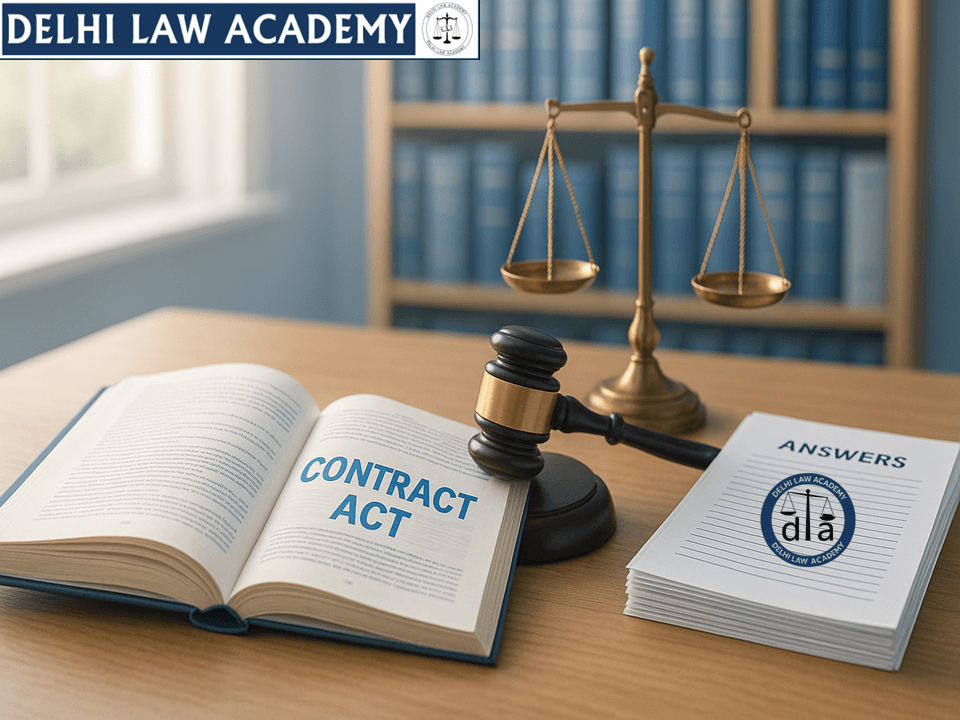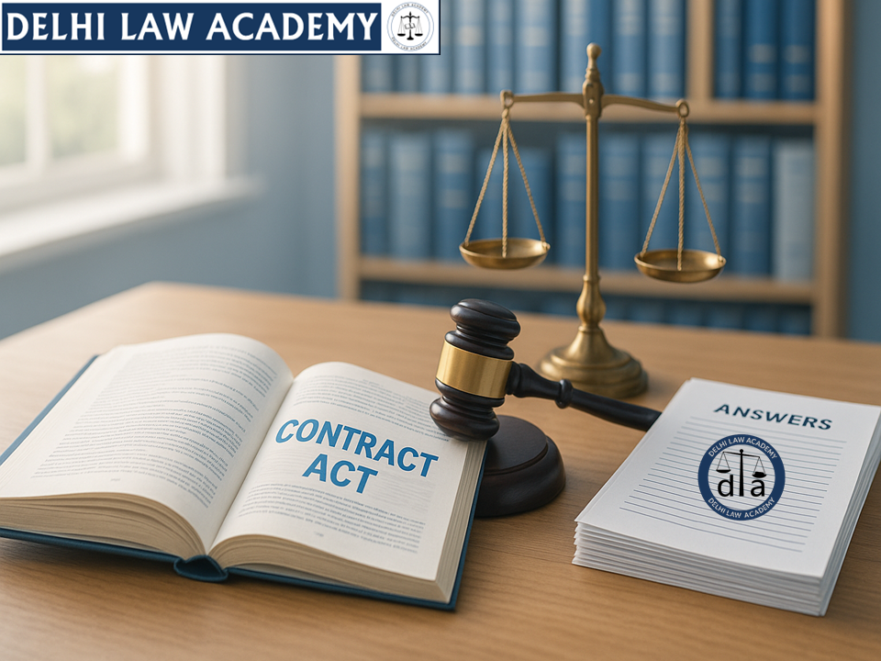
📘 Contract Act Test 1 – Fully Solved
For RJS, DJS, PCS(J) and other Judicial Service Exams
❓ Q1: A takes a life insurance policy making a false statement about his health and does not disclose the fact that he has been treated for a serious illness. In this case which statement is correct:
- Contract is voidable on the ground of misrepresentation
- The Contract is valid
- The Contract is void
- Contract is voidable on the ground of fraud
✅ Ans: d
❓ Q2: In which case has it been laid down that a promise to pay subscription is binding on the promisor if the promisee has undertaken some liability on the faith of the promise:
- Bhagwandas v. Girdhari Lal
- Lalman Shukla v. Gauri Dutt
- Banwari Lal v. Sukhdarshan Dayal
- Kedar Nath v. Gorie Mohd
✅ Ans: d
❓ Q3: The correct sequence in the formation of a contract is
- Offer, consideration, acceptance, agreement
- Agreement, consideration, offer, acceptance
- Offer, acceptance, consideration, agreement
- Offer, acceptance, agreement, consideration
✅ Ans: c
❓ Q4: Is past consideration for a promise valid to create a contract?
- It is valid both in Indian Law and English Law
- It is neither valid in English Law nor in Indian Law
- It is valid only in Indian Law and not in English Law
- It is valid only in English Law and not in Indian Law
✅ Ans: c
❓ Q5: An agreement not enforceable by law is:
- Voidable Contract
- Contract
- Valid Contract
- Void
✅ Ans: a
❓ Q6: Match List-I with List-II and select the correct answer using the codes given below the lists. Select the answer that corresponds to the order (a) (b) (c) (d).
List-I
- (a) Mohiri Bibi Case
- (b) Satyabrata Ghose Case
- (c) Hadley v. Baxendale
- (d) Carlill v. Carbolic
List-II
- 1. Remoteness of damage
- 2. Frustration of Contract
- 3. Invitation to treat
- 4. Minor’s contract
✅ Ans: d
❓ Q7: Acceptance sent through post:
- can be revoked at any time
- can be revoked only if it does not reach the offeror
- cannot be revoked at all
- can be revoked before it comes to the knowledge of the offeror
✅ Ans: d
❓ Q8: Where the relations subsisting between the parties are such that one of the parties is in a position to dominate the will of the other and uses that position to obtain an unfair advantage over the other is known as
- Coercion
- Misrepresentation
- Fraud
- Undue Influence
✅ Ans: d
❓ Q9: ‘A’ applied for allotment of 100 shares in ‘B’ company. A letter of allotment addressed to ‘A’ was posted in due time, but it never reached ‘A’. The posting of letter of allotment:
- does not complete the contract
- makes the contract void
- makes the contract voidable
- completes the contract
✅ Ans: d
❓ Q10: Every promise and every set of promises forming the consideration for each other, is known as
- Reciprocal Promises
- Contract
- Consideration
- Agreement
✅ Ans: d
Q11: A, from Kerala, writes a letter to B who lives in Delhi requesting the supply of certain goods at a certain price…
✅ Answer: a
Q12: A supplied to B, a minor, provisions such as wheat flour, rice and other food stuffs.
✅ Answer: d
Q13: Mohit lends Rs. One Lakh to Som where Narain was the surety. The contract in this transaction provided that the liability of Narain is limited to Rs. 50,000.
✅ Answer: a
Q14: Which of the following is not correct about the will theory of contract?
✅ Answer: d
Will theories maintain that commitments are enforceable because the promisor has “willed” or chosen to be bound by his commitment.
In this approach, the use of force against a reneging promisor is morally justified because the promisor herself has warranted the use of force by her prior exercise of will.
Will theories depend for their moral force upon the notion that contractual duties are binding because they are freely assumed by those who are required to discharge them.
This position leads quite naturally to an inquiry as to the promisor’s actual state of mind at the time.
Q15: A, a cultivator of green tea, agrees with B that he would not grow tea for a period of five years in consideration of which B agrees to pay him Rs. 25,000.
✅ Answer: d
Q16: A, a singer, enters into a contract with B, the manager of a theatre, to sing at his theatre two nights every week during the following two months…
✅ Answer: d
Q17: The legal phrase ‘pari passu’ means:
✅ Answer: d
📚 Continue Your Contract Act Preparation
Don’t stop here! Strengthen your knowledge of the Contract Act with our other fully solved tests:
📘 Free Study Material for Judiciary Aspirants!
Download our FREE study material prepared by Delhi Law Academy’s expert faculty.
📘 FAQs on Contract Act
The contract is voidable on the ground of fraud ✅.
Past consideration is valid only in Indian Law and not in English Law ✅.
Yes, since the provisions supplied constituted necessaries, the supplier can recover the money ✅.
On equal footing ✅.
No, such an agreement is void as it is in restraint of trade ✅.
The case is Kedar Nath v. Gorie Mohd ✅.
Contact us
📍 Delhi Law Academy – Jaipur Branch
6C, Tower 2, Coaching Hub, Pratap Nagar, Jaipur – 302033
📞 Phone:
+91 9911916552
+91 8447285606
✉️ Email:
contactus@delhilawacademy.com

